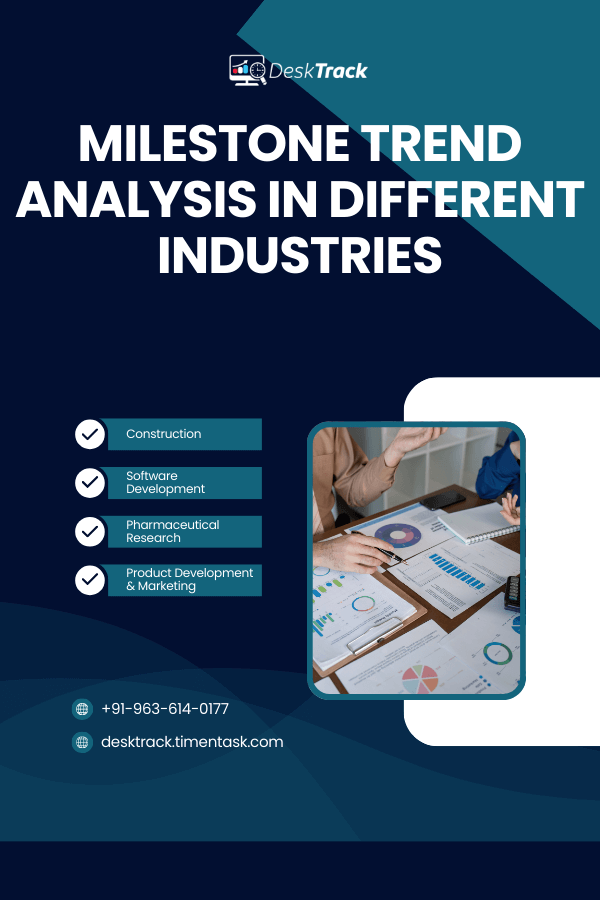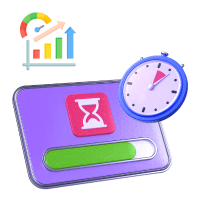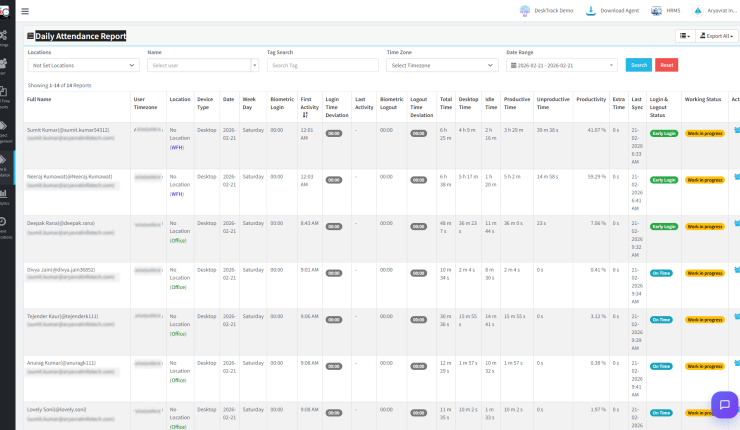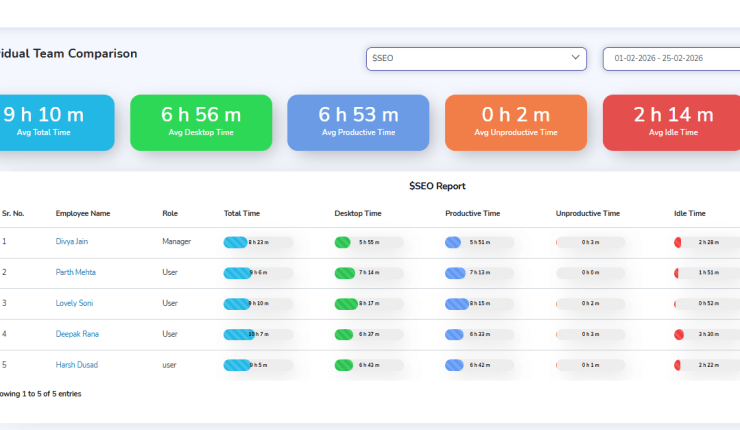Simply put, milestone trend analysis, or MTA in short, is one of the standard methods for tracking progress in project planning. The charts you create in this technique help your project managers assess whether the project is going downhill or uphill. Plus, you also get valuable insights into scheduling or scope for future ventures.
However, what’s the purpose of milestone analysis in project management? We will answer this and other questions in the blog post for today. Plus, we will reveal the tool you need to skyrocket project management efficiency and maximize employee productivity at the end. So, continue reading.
What is a Project Milestone?
A milestone in a project is the same thing as a checkpoint in video games. You use it to mark your progress. It can be anything, such as a date, time, task, or event to show the turning point in the work. These can also be points in the entire lifecycle of the project, when you expect your teams to make a crucial decision or submit deliverables.
After reaching a certain event or set of milestones, you can evaluate the progress on the surface level. Comparing your original estimates to your current situation, assessing the objectives accomplished so far, and looking for new opportunities to improve and continue is also made possible at this point. Here’s an example of milestones in book publishing.
- Submitting the manuscript.
- Editing and proofreading.
- Preparing the book for publishing, marketing, and distributing.
Read Also: What is Scope Creep in Project Management?
How Many Milestones Should You Have in Your Project?
As we all know, every other project is a variation and a new challenge. Not only that, but even some phases within one can be longer or more tedious than others. So, simply put, any number of milestones is neither right nor wrong for your project. However, these should be relevant and major to your project. Here are some key points:
- These dots will be unique to your individual project. However, as a project manager, you would be able to immediately identify what those points should be.
- Some milestones will be more critical than others. So, you will have to finalize which ones you will assess yourself and which ones will need the teams to work together to figure it out.
What is Milestone Trend Analysis?

Milestone trend analysis balances, makes it easy to read, and combines history and forecast for the milestones that become the chosen ones. Project managers use it to control projects by evaluating graphically illustrated time-related discrepancies. The MTA:
- Provides you with simple reports with easy-to-read charts.
- Shows deadline obstructions and obstacles in the beginning stages of the project because of a clear trend overview.
- Enables a realistic prediction of the project progression.
An Overview of the Milestone Trend Analysis Chart
Make your workday more productive
Time tracking and work management can help you reach your goals
faster.
A milestone trend analysis chart has various elements to represent, such as:
- The project period is on a vertical axis.
- The reporting period is on the horizontal axis.
- Each milestone is displayed on the vertical axis. The earlier the target date, the lower it is on the axis. However, only when the entire project is initiating.
If you keep updating the project plan and saving the status of the upcoming milestone (via a digital tool), you will start to notice MTA curves due to the shifts in the course of the project. Nonetheless, the lines show the following.
- Horizontal lines translate to the checkpoint date not being changed compared to the previous reporting bracket.
- If you see a decreasing line, you should deduce that a milestone has been pushed forward and it now has an earlier schedule. However, if you see an increasing line, it means a delay in the schedule due to a shift in the future.
Why is Milestone Analysis in Project Management Crucial?

Milestone analysis in project management is critical because it provides your workers with a visualization of what’s working and what’s not. Here, teams can view if their milestone deadlines are on track, too ambitious, or not ambitious enough. Plus:
- It also assists you in identifying obstructions and other constraints, representing problems with the other planning aspects or the scope of your project.
- If you see that milestone deadlines are constantly being missed in the chart, you can deduce that your project might be at risk of getting delayed.
- It assists you in pinpointing whether your teams are running ahead of or behind schedule.
How Milestone Trend Analysis Works
Each milestone must be equipped with a deadline. Milestone trend analysis employs a visual line graph to analyze project progress according to the deadlines. To provide you with an instance, you can predict that the first milestone is due on Monday, the second one is due in two weeks, and the third one is due in 4 weeks. Whatever the scenario, the line on the chart must join the dots together. I.e., milestones.
As we mentioned before, the reporting periods are on the X-axis and the milestones are on the Y-axis. If these corresponding points are connected, it results in a line, representing the progress. Again:
- If the line is horizontal, the project is on schedule
- Lines trending upwards represent that the project is in jeopardy due to experienced delays.
However, when you see the line going downhill, it means that the project is ahead of schedule. You can ensure that this is the case with all your projects by using an employee monitoring software solution, such as DeskTrack, to track how your teams are working and skyrocket efficiency. That’s because project success depends on how efficiently your teams work.
Advantages of Trend Analysis
Analyzing trends in the milestone has many pros. These include:
- The ability to visualize progress.
- The opportunities to avoid risks and get rid of all obstacles. Plus, even prevent them from ever happening.
- It will also assist you in handling all obstructions as you reshape your plan around unexpected forks on the road.
Read Also: All You Need to Know About the DuPont Shift Schedule
Do Your Projects Need a Milestone Trend Analysis Chart?
The answer is yes and no. Milestone analysis in project management is beneficial if the project work itself is long-term and complex. In the case of simple or short-term collection of tasks, teams and managers usually evaluate the progress after everything is wrapped up. However, such projects will still gain benefit from having visual goals and progress data on the face of it.
Milestone Trend Analysis in Different Industries

To better wrap our heads around milestone trend analysis, we virtually tried and tested several use cases. With that being said, here are some practical applications of this concept related to project management.
1. Construction
Construction businesses will track milestones, such as foundation complete or roof installed. This helps monitor the overall project schedule and spot delays in work.
2. Software Development
Here, the milestones to track are beta release, user acceptance testing complete, and other related things. This helps manage the complexities that come with software releases, leading to timely deliveries.
3. Pharmaceutical Research
Pharmaceutical research organizations must monitor clinical trial phases for success. So, their milestones will be like phase 1 complete or FDA approval. This is crucial for analyzing the lengthy development cycle and spotting potential obstructions.
4. Product Development & Marketing
Again, here the checkpoints will be such as, new product launch or a campaign go-live. This is beneficial for analyzing market entry agility and product release effectiveness.
Analyse Milestone Trends & More with DeskTrack
DeskTrack provides you with the power of real-time project management. Not only can you subdivide the work into as many workspaces, tasks, workflows, lists, checklists, and subtasks as required, but you can also track their progress and statuses in real-time. DeskTrack shows you how, when, what, and how much work is happening, along with who is doing it, for instilling accountability and responsibility. Plus, you can also see proof of work and streamline workflows with real-time screenshot monitoring, time tracking, and app, URL, and file usage tracking to maximize employee productivity. Get your 15-day trial today and see why 8000+ businesses trust the employee monitoring software. Get real work done with DeskTrack.
Frequently Asked Questions (FAQ)
Q. What is a Project Milestone?
Ans. A milestone in a project is the same thing as a save point in video games. You use it to mark your progress. It can be anything, such as a date, time, task, or event to show the turning point in the work. These can also be points in the entire lifecycle of the project, when you expect your teams to make a crucial decision or submit deliverables.
Q. What is Milestone Trend Analysis?
Ans. Milestone trend analysis balances, makes it easy to read, and combines history and forecast for the milestones that become the chosen ones. Project managers use it to control projects by evaluating graphically illustrated time-related discrepancies.
Q. Why is Milestone Analysis in Project Management Crucial?
Ans. Evaluating milestones is critical in project work because:
- It provides your staff with a visualization of what’s working and what’s not.
- It lets teams view if their milestone deadlines are on track, too ambitious, or not ambitious enough.
- It also assists you in identifying obstructions and other constraints, representing problems with the other planning aspects or the scope of your project.
- If you see that milestone deadlines are constantly being missed in the chart, you can deduce that your project might be at risk of getting delayed.
- It assists you in pinpointing whether your teams are running ahead of or behind schedule.
Q. What are the Advantages of Trend Analysis?
Ans. Analyzing trends in the milestone has many pros. These include:
- The ability to visualize progress.
- The opportunities to avoid risks and get rid of all obstacles. Plus, even prevent them from ever happening.
- It will also assist you in handling all obstructions as you reshape your plan around unexpected forks on the road.
Q. Do Your Projects Need a Milestone Trend Analysis Chart?
Ans. The answer is yes and no. Milestone analysis in project management is beneficial if the project work itself is long-term and complex. In the case of simple or short-term collection of tasks, teams and managers usually evaluate the progress after everything is wrapped up. However, such projects will still gain benefit from having visual goals and progress data on the face of it.




















